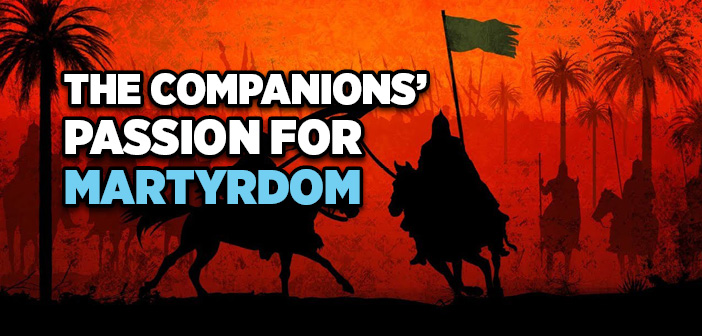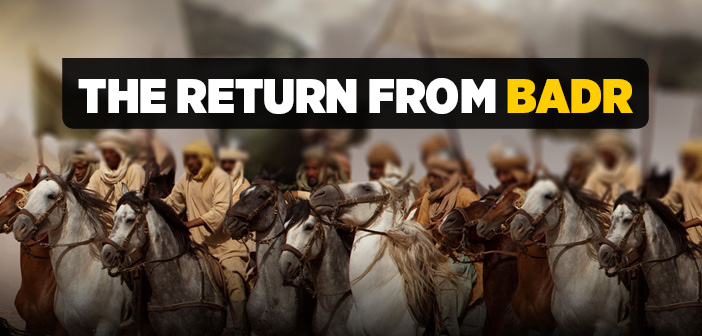What is martyrdom? What the companions’ passion for martyrdom?
Amr ibn Jamuh, the leader of the Salimah clan of the Ansar, was a lame man, whose four sons used to participate in battles alongside the Blessed Prophet -upon him blessings and peace-. Right when the Believers were about to leave Medina for Uhud, Amr expressed his desire to join, too.
“You are not obliged to go to battle”, said his sons. “Allah considers you to have a legitimate excuse. We are going in your place, anyhow.”
“You stood in the way of me entering Paradise on the day of Badr”, he responded. “Even if I survive today, by Allah, I will definitely become a martyr one day and enter Paradise!” Amr then turned to his wife:
“Do you expect me to sit with you while everyone else vies for Paradise through martyrdom?” Then grabbing his shield, he made his way out of the house towards the Prophet of Mercy -upon him blessings and peace-, praying, “Allah…Do not grant me a return to my family!”
He soon arrived next to the Noble Prophet -upon him blessings and peace-.
“My sons wish to leave me behind in Medina. They are preventing me from setting out for battle with you, whereas I, by Allah, am eager to enter Paradise in spite of my lame leg!” he said to the Messenger of Allah, who said:
“Allah has excused you. Jihad is not obligatory for you.”
“But Messenger of Allah,” replied Amr, “wouldn’t you also wish to see me fight in the way of Allah until the very end and walk to Paradise with this lame leg of mine?”
“I would”, replied the Blessed Prophet -upon him blessings and peace-. Then turning to Amr’s sons, he said, “Withhold your father from battle no more. Perhaps Allah will grant him martyrdom!”
Amr turned to the direction of qibla.
“Allah, grant me martyrdom and do not make me return to my family deprived and grieved!” he prayed.
Ending up taking active part at Uhud, Amr was noted to have kept on saying during the battle, “Paradise, by Allah, is what I miss”. Consequently, he became a martyr along with one of his sons who was trying to protect him. Later, the Blessed Prophet -upon him blessings and peace- said, regarding him:
“By Allah, in whose Hand of Might my life resides, I saw Amr limping in Paradise.” (Waqidi, I, 264-265; Ibn Athir, Usd’ul-Ghabah, IV, 208)
Inspecting the army just before their march to Uhud, the Blessed Prophet -upon him blessings and peace- was refusing to admit those who were too young to take part. Among those deemed too young were Samurah ibn Jundab and Rafi ibn Hadij. Zuhayr ibn Rafi intervened on Rafi’s behalf, stating, “Rafi is a skillful archer, Messenger of Allah!” The rest is explained by Rafi himself:
“I was standing on my toes in order to look tall. The Messenger of Allah -upon him blessings and peace- eventually allowed me to remain. Hearing that, Samurah said to Muray ibn Sinan, his foster father, ‘The Messenger of Allah has given Rafi permission to stay and told me to return, yet I am a better wrestler than Rafi!’ So Muray -Allah be well-pleased with him- told this to the Messenger of Allah, who, then looked at both Samurah and I, and told us to lock arms in wrestling. We wrestled and Samurah beat me. As a result, he was allowed to remain, too. (Tabari, Tarih, II, 505-506; Waqidi, I, 216)
Upon reaching Uhud, the Blessed Prophet -upon him blessings and peace- took Mount Uhud behind his army of Believers and placed fifty archers on Aynayn Hill fifty in case the enemy would attempt an incursion through the valley in between. He designated Abdullah ibn Jubayr as their commander, and stressed them to, “…cover our backs and regardless of an enemy win or loss, do not leave your place before I tell you to!” (Ibn Hisham, III, 10; Ahmad, I, 288)
As was custom, the Battle, again, got under way with a one on one challenge, a mubaraza. It only took one swift strike for Ali -Allah be well-pleased with him- to take care of the idolaters’ flagbearer, Talha. His brother Othman, who took the Quraysh flag after Talha, did not trouble Hamza -Allah be well-pleased with him-. Neither did their third flagbearer cause much worry for Saad ibn Abi Waqqas -Allah be well-pleased with him-.
The Battle then began with all its intensity. Right before the ferocity of the battle reached its highest pitch, the Messenger of Allah -upon him blessings and peace-, holding aloft a sword in his hand, inscribed on which were the words, “There is shame and disgrace in cowardice, while honor and dignity in courage”, asked:
“Who is willing to take this from me?”
The Companions all put their hands up, competing for the coveted sword.
“Who will take this sword from me in return for paying its due?” then asked the Blessed Prophet -upon him blessings and peace-, after which they began feeling a little uneasy about taking it. But Abu Dujanah -Allah be well-pleased with him-, from the Ansar, asked:
“What is its due, Messenger of Allah?”
“…for you to fight with the enemy until it becomes bent and twisted!” said the Blessed Prophet -upon him blessings and peace- .
“I will take it and I promise to pay its due!” said Abu Dujanah.
Taking the sword and with a red turban around his head, Abu Dujanah -Allah be well-pleased with him- began swaggering amid the ranks, with a seeming look of arrogance. Seeing his boastful demeanor, the Blessed Prophet -upon him blessings and peace- remarked, “That is the kind of walk Allah hates, except in situations like this!” (Ibn Hisham, III, 11-12; Waqidi, I, 259; Muslim, Fadail’us-Sahabah, 128)
Just before the Battle, Muhayriq, a Jewish scholar, accepted Islam. He very well knew that the Blessed Prophet -upon him blessings and peace- perfectly corresponded with the attributes disclosed in the Torah; yet he could not make a clear breast of it until the day of Uhud. As the Blessed Prophet -upon him blessings and peace- was leaving for Uhud, with the Companions behind him, Muhayriq snapped at his fellow Jews:
“I am certain that you are very well aware of Muhammad being a prophet and that you are obliged to help him!”
The Jews were sarcastic:
“Today is Saturday…We cannot do anything!”
“There is no such thing as Saturday for you!” answered angrily Muhayriq, as he grabbed his sword and what else he may need. Before leaving, he left the following message to one of his relatives:
“If I am killed today, Muhammad is to take all my inheritance. He will make use of it in the best possible way as shown by Allah.” It did turn out to be his will, as he was martyred at Uhud. The date garden he left behind was taken by the Noble Messenger -upon him blessings and peace- and made into a waqf. The Blessed Prophet -upon him blessings and peace- complemented him with the words:
“Muhayriq is the best of Jews!” (Ibn Hisham, III, 38; Waqidi, I, 263; Ibn Sad, I, 501-503)
Amazing scenes followed one after the other at Uhud.
A Medinan by the name of Quzman after having killed seven idolaters in the Battle died as a result of a fatal wound. In spite of this, the Blessed Prophet -upon him blessings and peace- declared:
“Quzman is Hell bound.” This was for no other reason than when congratulated, by Qatadah ibn Numan, during his final breaths, over the blessing of being martyred in the way of Allah, glory unto Him, Quzman had replied:
“I fought for my tribe, not for martyrdom”, after which he pushed his weight onto his sword and committed suicide. (Waqidi, I, 263)
In contrast, Usayram, who later felt remorse over his initially stern opposition to his people’s decision to enter Islam, came to the Blessed Prophet -upon him blessings and peace- armed from head to toe, and asked:
“Should I join you in the Battle or first accept Islam?”
“Accept Islam then join us”, responded the Noble Messenger -upon him blessings and peace-, whereupon Usayram became a Muslim, before a battle which was to see him fall martyr. Regarding Usayram, the Blessed Prophet said, “He worked little, but gained a lot!” (Bukhari, Jihad, 13; Muslim, Imarah, 144)
His final words to the curious onlookers, as he lay among the wounded, were, “I only came for Islam, fought in the way of Allah and His Messenger; and I lay wounded as a consequence.”
Abu Hurayrah -Allah be well-pleased with him- later subjected him to a riddle where he would ask other Companions to tell him “the person who entered Paradise without offering salat even once in his life.” It was, of course, none other than Amr ibn Thabit, better known as Usayram. (Ibn Hisham, III, 39-40; Waqidi, I, 262)
During the Battle, Abdullah ibn Jahsh’s -Allah be well-pleased with him- sword was broken. The Prophet of Allah -upon him blessings and peace- gave him a date branch in its place, which, in Abdullah’s hands, turned into a sword. Abdullah -Allah be well-pleased with him- used the sword until he was martyred. Called Urjun, while with the inheritors of Abdullah -Allah be well-pleased with him-, the sword was later purchased by a Turkish chieftain for two-hundred dinars.[1]
The Muslim onslaught of never before seen enthusiasm brought victory in a short amount of time; the idolaters, despite an evident superiority of numbers and weaponry, began to flee. Pursuing the idolaters for some time, the Muslims, beginning to feel certain that battle was now well and truly won, left the chase and instead turned towards collecting the wealth of spoils the idolaters had left behind in concern for their lives. Not only that, even a bulk of the archers, despite being desperately reminded of the Prophet’s -upon him blessings and peace- instructions against leaving the hill until they were told, left their positions in pursuit of spoils. Only Abdullah, the commander of the archers, and seven others were left standing on Aynayn Hill.
That proved to be the turning point. Khalid ibn Walid, the shrewd commander of the enemies, had now found the opportunity he had been waiting for with his cavalrymen all along. In a swift raid around the back of the hill, they were able martyr the eight archers left high and dry on the hill, who could not stand the ferocity of the incursion. The ferocity would soon extend to the entire battlefield; the Believers busy with collecting the spoils were awoken to a brutal raid behind them, made worse moments later when the fleeing idolaters took notice of the turn of the tide and ran back to the battlefield to complete the ambush. The Muslim Army was now wedged in a crossfire. They found themselves in a chaotic frenzy.
[1] Ibn Athir, Usd’ul-Ghaba, III, 195; Diyarbakri, I, 433.
Source: Osman Nuri Topbaş, The Prophet Muhammed Mustafa the Elect II, Erkam Publications





